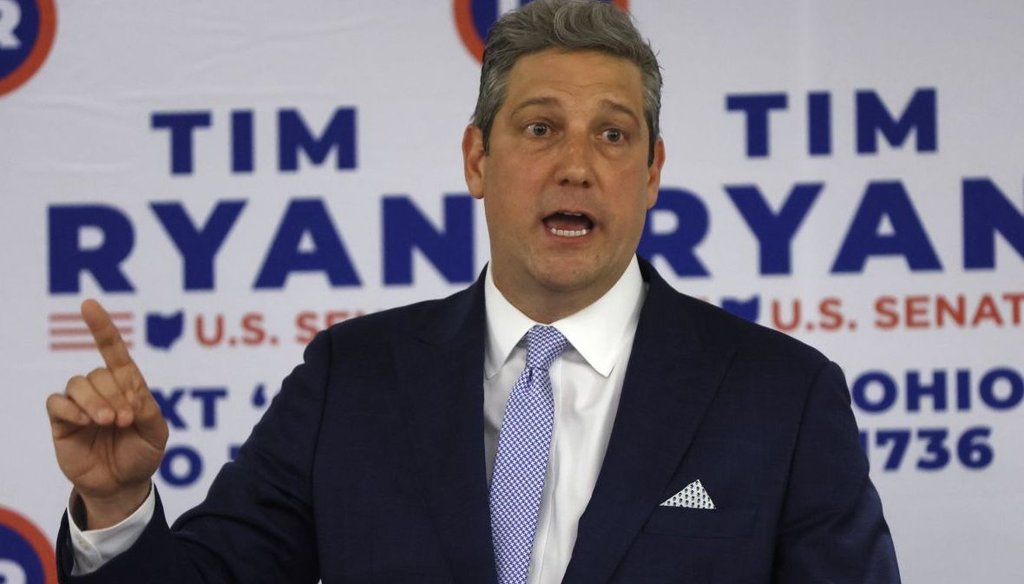Stand up for the facts!
Our only agenda is to publish the truth so you can be an informed participant in democracy.
We need your help.
I would like to contribute

Rep. Tim Ryan, D-Ohio, a Senate candidate, speaks to supporters on primary day, May 3, 2022, in Columbus, Ohio. (AP)
If Your Time is short
• The major Democratic bill on climate change, health care and corporate taxation signed by President Joe Biden was dubbed the Inflation Reduction Act.
• Despite that optimistic nickname, critics charge the new law doesn’t do much to tackle inflation.
• Most independent estimates project that the measure will have a very limited impact on inflation. What impact it does have will likely take several years to realize, and that’s probably too long to make a dent in the current 40-year high levels of inflation, experts say.
When the major Democratic bill on climate change, health care and corporate taxation was being finalized, its Senate backers settled on a title that reflected the reality that inflation was at a 40-year high. They called it the Inflation Reduction Act.
But as the legislation was being debated — and after it passed on a party-line vote Aug. 7 — Republican critics sought to turn this language against the bill’s supporters. The measure wouldn’t actually do much of anything to curb inflation, they argued.
Democratic Rep. Tim Ryan, who’s running a stronger-than-expected Senate race in the GOP-leaning state of Ohio, sought to neutralize the critics’ rhetoric. In an Aug. 17 tweet, he shared a chart that paired arguments against the bill with his counterarguments.
"There’s been a lot of misinformation about the Inflation Reduction Act floating around," he tweeted from his official House account. "Now that this historic legislation is now law, let’s get to the bottom of what this bill really does — and doesn’t!"
One of the statements that Ryan sought to debunk was that the bill "will increase deficit spending." Ryan’s rejoinder: The bill "will pay down the national debt & fight inflation."
Here, we’ll look at both parts of Ryan’s statement. Because these comments are predictions, we won’t rate them on our Truth-O-Meter.
Will the legislation "pay down the national debt"?
There's nothing in the legislation that would do that.
Understanding why depends on understanding the difference between the debt and the deficit.
The bill aims to reduce the deficit. The deficit is the annual gap between how much the federal government spends and how much revenue it collects.
Most estimates project that the Democratic bill’s provisions would reduce the federal deficit by a cumulative $305 billion through 2031. An estimate from the Committee for a Responsible Federal Budget projects that the measure would reduce deficits by $1 trillion over two decades. That number could climb to nearly $2 trillion if the savings on interest are included, the committee said.
However, these reductions would not be enough to actually "pay down the national debt."
Debt is the accumulation of all prior deficits, minus any annual surpluses. And the debt would still be rising with this bill’s provisions in play. It would just be rising at a slower pace.
"By reducing deficits, you slow the growth of the debt and hopefully shrink it as a percentage of gross domestic product," said Steve Ellis, president of Taxpayers for Common Sense. "But that still isn’t ‘paying down the national debt.’"
To pay down the debt in absolute terms would require running federal budget surpluses. All or part of these surpluses would then need to be used to actually pay off bonds held by the public.
"That would require significant increases in taxes and reductions in spending," said Kyle Pomerleau, a senior fellow at the American Enterprise Institute. And those tax increases and spending cuts are far beyond the scope of what the Democratic bill included, he said.
Ryan’s office told PolitiFact that because of the deficit reduction, debt would be lower than it would have been without the bill, even if it’s not lower in absolute dollars.
Will the legislation "fight inflation"?
This is far from a certainty.
A broad swath of expert opinion suggests that the measure’s impact on inflation will be modest, and could border on zero.
The White House and other Democrats have touted a letter signed by more than 100 prominent economists. The letter says the legislation "will fight inflation and lower costs for American families while setting the stage for strong, stable, and broadly-shared long-term economic growth."
The letter specifically cites provisions in the bill that could leave more money in Americans’ pockets. Those provisions allow Medicare to negotiate lower prices with pharmaceutical companies; reduce Medicare out-of-pocket costs for drugs; and prevent insurance premiums from spiking under the Affordable Care Act.
The bill’s deficit reduction should also put "downward pressure on inflation," the economists wrote. That’s because reduced federal spending would have a cooling effect on demand that could otherwise promote inflation.
Ryan’s office told PolitiFact that the law "moves the needle on inflation in the right direction," even though it can’t wipe out inflation fully.
However, several independent analyses have concluded that the bill wouldn’t actually move the needle much on inflation either way.
The Penn-Wharton Budget Model at the University of Pennsylvania concluded that the measure’s "impact on inflation is statistically indistinguishable from zero."
The Congressional Budget Office, Congress’ independent arbiter for budget matters, wrote that the measure’s impact on inflation would be "negligible" in 2022 and either slightly lower or slightly higher in 2023.
And the right-of-center Tax Foundation, wrote that, "on balance, the long-run impact on inflation is particularly uncertain but likely close to zero."
The Committee for a Responsible Federal Budget offered a somewhat rosier assessment. It said the measure should "very modestly reduce inflationary pressures in the near term while lowering the risk of persistent inflation over time." Doing so would "make it easier for the Federal Reserve to reduce inflation without causing a recession," according to the group’s analysis.
Moody’s Analytics, meanwhile, also gave a more optimistic assessment of the legislation’s inflation-fighting potential: "Broadly, the legislation will nudge the economy and inflation in the right direction," it wrote.
This impact will be slow to develop, however, Moody’s cautioned: "Through the middle of this decade, the impact of the legislation on inflation is marginal, but it becomes more meaningful later in the decade." (The Congressional Budget Office pointed out in its analysis that it did not study the impact on inflation beyond 2023, just two years into a 10-year bill.)
Provisions that would take time to reduce inflationary pressures include those focused on climate change. One example is tax credits for renewable energy. Moody’s said such provisions could eventually reduce the typical American household’s spending on energy by more than $300 per year. That savings could grow even larger if carbon emission reductions help mitigate extreme weather events, thereby leading to lower property insurance costs.
Similarly, the provision that allows Medicare to negotiate for drug prices will be phased in over several years. That would mean that the savings for beneficiaries won’t kick in immediately.
The legislation's deficit-reduction portion is pinned largely to more aggressive corporate taxation. But the Tax Foundation warned that the hoped-for deficit reduction might not materialize if companies find loopholes in the new tax structure. Companies hit by higher corporate taxation could also pass some of their added tax burden on to consumers through higher prices.
"I expect the effects on aggregate consumer price inflation will be quite small and spread out over a number of years," said Steve Fazzari, an economist at Washington University in St. Louis. "The much bigger impact of this set of policies will be to address climate change and improve health security for Americans rather than having a meaningful effect on inflation."
Deficit reduction of this scale is small compared with the economy as a whole, said Douglas Holtz-Eakin, president of the American Action Forum, a center-right think tank. The progress on the deficit will also be undercut by new spending approved in other recently passed bills. The PACT Act expands veterans health care and the Chips and Science Act bolsters the country’s technology and manufacturing base. The deficit savings in future years could be eaten up by added spending from these and other bills, Holtz-Eakin said.
Ultimately, the Federal Reserve matters much more for fighting inflation, Holtz-Eakin said.
"There’s no serious deficit reduction in the bill until the second five years," he said. By that time, any impact from this bill would be moot, he said: "If the Fed doesn’t have inflation under control by 2028, we’ll be facing a revolution."
Our Sources
Tim Ryan, tweet, Aug. 17, 2022
Congress.gov, H.R. 5376: Inflation Reduction Act of 2022
White House, "By the Numbers: The Inflation Reduction Act," Aug. 15, 2022
Congressional Budget Office, letter to Lindsey Graham, Aug. 4, 2022
Penn-Wharton Budget Model, "Inflation Reduction Act: Preliminary Estimates of Budgetary and Macroeconomic Effects," July 29, 2022
Committee for a Responsible Federal Budget, "IRA Changes Could Erase $500 Billion of Long-Term Savings," Aug. 16, 2022
Committee for a Responsible Federal Budget, "What's In the Inflation Reduction Act?" July 28, 2022
Committee for a Responsible Federal Budget, "IRA Will Help Fed Fight Inflation," Aug. 1, 2022
Tax Foundation, "Details & Analysis of the Inflation Reduction Act Tax Provisions," Aug. 12, 2022
Moody's Analytics, "Assessing the Macroeconomic Consequences of the Inflation Reduction Act of 2022," August 2022
PolitiFact, "The Democrats’ big IRA bill fulfills some Biden promises, leaves others behind," Aug. 12, 2022
Email interview with Garrett Watson, senior policy analyst and modeling manager with the Tax Foundation, Aug. 18, 2022
Email interview with Gary Burtless, senior fellow at the Brookings Institution, Aug. 18, 2022
Email interview with Steve Fazzari, economist at Washington University in St. Louis, Aug. 18, 2022
Email interview with Kyle Pomerleau, senior fellow at the American Enterprise Institute, Aug. 18, 2022
Email interview with Steve Ellis, president of Taxpayers for Common Sense, Aug. 18, 2022
Interview with Douglas Holtz-Eakin, president of the American Action Forum, Aug. 18, 2022
Email interview with Caty Payette, spokeswoman for Tim Ryan, Aug. 18, 2022




































